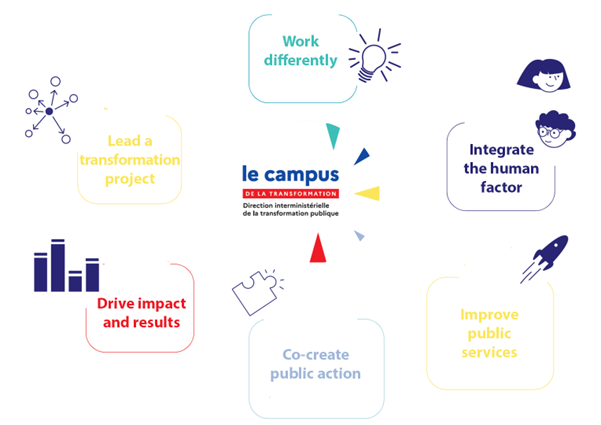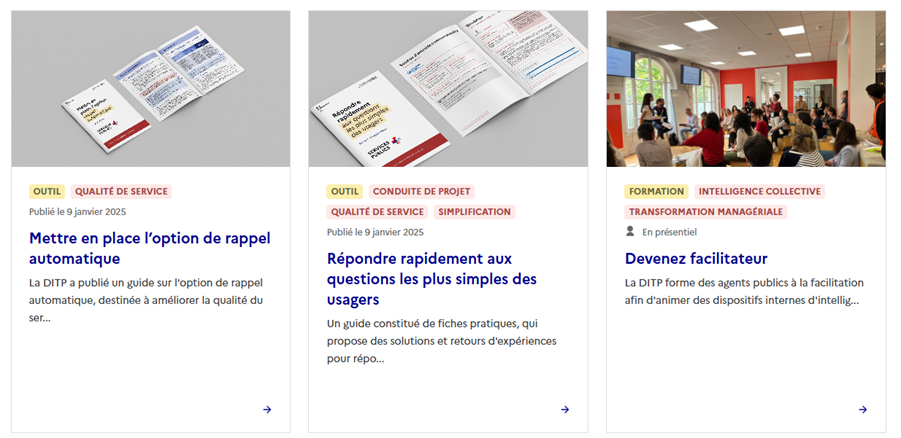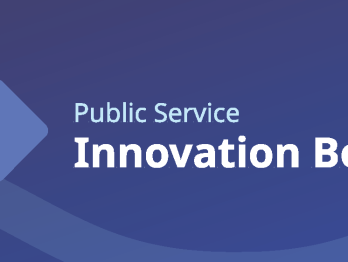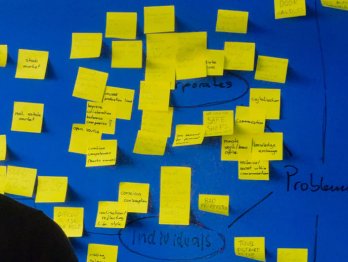The “learning by doing” campus: France’s approach to innovation skill development

This blog post is part of a series on public sector innovation skills and applied capabilities, focusing on the conceptualisation of public sector innovation skills and applied capabilities, the practical pathways for development within the constraints of public administrations, and the connection between innovation skills and meaningful public sector transformation and impact on strategic goals and policy priorities.
- How can public servants develop the skills they need to drive meaningful innovation in government?
- What are the most effective ways to build capabilities that go beyond traditional training models and enable public sector professionals to experiment, adapt, and collaborate in real time?
- And how can learning be embedded into the daily work of public administrations to ensure that innovation is not an isolated effort but a sustained and systemic practice?
These are longstanding questions for the OECD Observatory of Public Sector Innovation and ones that remain central as governments attempt to equip their public servants with the tools to navigate complexity, respond to emerging challenges and drive transformative change. We have been following recent developments in France which may provide some answers.
In November 2024, France launched the Public Transformation Campus (CAMPUS de la Transformation Publique), an ambitious initiative designed to equip public servants with the skills and capabilities needed to drive meaningful change within government. Led by the Direction interministérielle de la transformation publique (DITP), this programme stands apart from traditional public sector training by embedding a learning-by-doing approach at its core and leveraging the collective intelligence of the public sector.
Moving beyond classic formal training, the campus supports adaptive learning pathways and builds communities of practice that enable public sector professionals to innovate and experiment in real-time. Instead of working in isolation, the Campus serves as a node, collaborating with the DGAFP (Directorate for Public Administration and the Civil Service) and INSP (National Institute of Public Service), 134 innovation labs, and expert transformation communities to further spread innovation skills. The offer is diverse: from introductory courses on innovative methods (public service design, behavioural sciences, citizen participation, etc.) to certification-based and practical training, such as Operational Excellence or co-development.

Learning by doing: a shift towards applied learning
For transformation to take root in public administration, theoretical knowledge alone is insufficient. The Public Transformation Campus embraces the réflexion-action methodology, a hands-on approach that encourages public agents to learn through experimentation and iterative problem-solving. By engaging directly with transformation challenges, participants gain practical insights that are immediately applicable to their work. This shift from passive learning to active problem-solving mirrors the complex realities of public administration, where dynamic conditions require adaptive thinking and continuous learning.

To support this approach, the campus offers multimodal learning experiences. Alongside online courses accessible to over 700,000 public agents via the Mentor platform, in-person and hybrid training sessions provide opportunities for interactive learning. Instead of following rigid training structures, participants engage in tailored transformation pathways that combine formal instruction with real-world application. Practical toolkits, guides and innovation labs help embed these new skills, ensuring that training translates into concrete outcomes within government institutions.
Adaptive pathways: tailoring transformation to real needs
One of the unique features of the Public Transformation Campus is its focus on adaptive pathways, ensuring that training aligns with the evolving needs of public services. Recognising that transformation is not a formulaic process, the campus provides custom-designed learning journeys that respond to the specific challenges faced by public institutions. This flexibility allows public agents to co-create their own learning experiences, selecting relevant resources and applying them in their professional context.
Communities of practice: strengthening collective intelligence
The Campus focuses on the collective nature of change. Recognising that public sector challenges are complex and interdependent, the campus actively supports communities of practice – peer networks that facilitate knowledge-sharing, collaboration and mutual learning. The collective intelligence of officials can be powerful if adequately connected and this is what the Campus is actively building up.

Through partnerships with established public training institutions such as Institut National du Service Public (INSP) and Réseau des Écoles de Service Public (RESP), as well as research organisations and professional associations, the campus connects public servants with a diverse ecosystem of expertise. A community of 1,300 facilitators, co-development practitioners and transformation leaders sustain this network, ensuring that innovation is not confined to isolated training sessions but embedded into the daily practices of government institutions, without the need for external resources.
These peer networks also act as a vital support system for public servants navigating the complexities of transformation. By creating spaces for dialogue, reflection and shared problem-solving, the campus enables public agents to learn from each other’s experiences, avoid common pitfalls and refine their approaches through collective intelligence.
Scaling impact through embedded learning
The Public Transformation Campus represents a fundamental rethinking of how public servants are equipped to drive change. By moving beyond traditional training models to embrace learning by doing, adaptive pathways and communities of practice, the initiative ensures that transformation is embedded within public institutions rather than existing as an abstract goal or an isolated and ephemeral organisational capability. In addition to the 23 training courses, the Campus also produced over 50 thematic guides and practical tools like the “Managerial Transformation Toolkit”.

In terms of evaluation of the overall effort—the contribution of these innovation skill building activities to the overall ability of the public sector to innovate, transform, and achieve broad policy objectives—remains elusive but of interest to France as well as many other capability-building units in governments who are looking into ways of identifying this link.
As public administrations across the world seek to build the capabilities necessary for transformation – green, digital, or others – the French experience offers valuable insights. The Public Transformation Campus demonstrates that investing in applied innovation skills of public officials, creating flexible learning journeys and strengthening professional networks can empower public servants to lead change effectively.
This blog is funded by the European Union. Its contents are the sole responsibility of the authors and do not necessarily reflect the views of the European Union.













